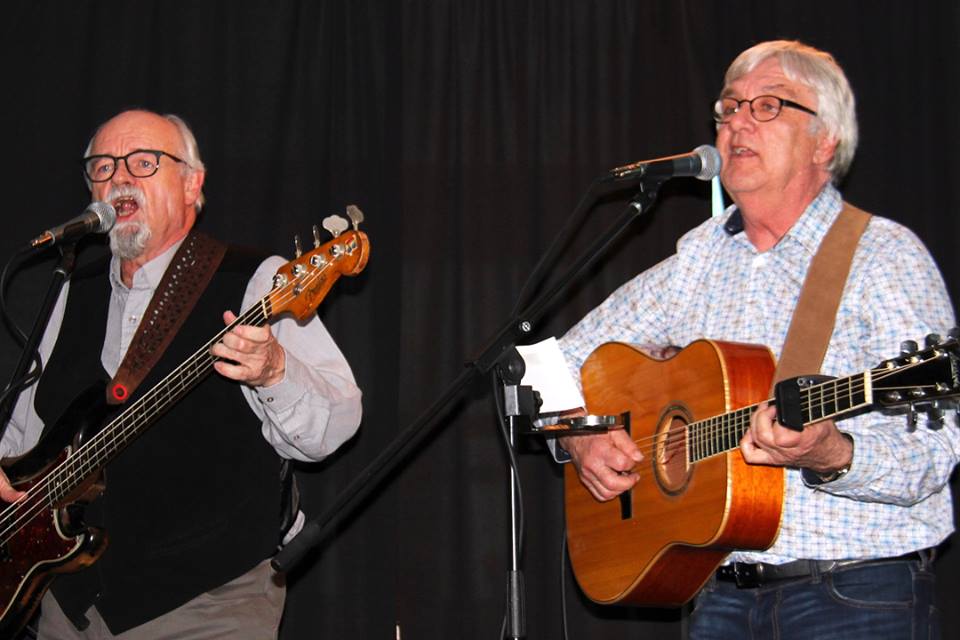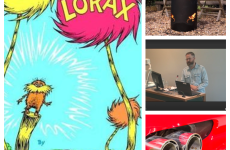Celtic Serenade
Donnie Campbell — or “Sydney River musician,” as the online edition of the Cape Breton Post identified him — has been awarded a 2019 Stompin’ Tom Award by the East Coast Music Association (ECMA).
(Full disclosure: Donnie is my first cousin once removed on my mother’s side. Fuller disclosure: I share none of his musical ability.)
For those of you too young to remember Stompin’ Tom Connors, the Skinner’s Pond musician for whom the prize is named, I should note that he had a rather vexed relationship with awards — he famously returned his Junos in 1978 to protest the prizes being given to Canadians no longer living in the country. (He bore the grudge to his grave, in fact, leaving instructions the Junos were not to mark his death during that year’s awards ceremony.)
So in 1993, when the ECMA’s awarded Connors the Dr. Helen Creighton Award for Lifetime Achievement, they must have done so with some trepidation. And in fact, although he accepted the award, he attached a string, which was that the association should establish another award to honor “all those who have made a long-term contribution to the East Coast Music Industry, and have paved the road for many successful East Coast artists of today.” (I’m not sure if he specified they had to live on the East Coast, but I’m guessing it was probably implied.)
Thus the Stompin’ Tom award was established and is presented annually to one individual or group from each of the East Coast Music Association’s five regions (Prince Edward Island, New Brunswick, Mainland Nova Scotia, Newfoundland & Labrador and Cape Breton).
I have to think Connors would approve the award being given to Donnie, a musician who has spent his whole life in Cape Breton; who plays music the way most of us draw breath — as though it were a thing simultaneously effortless and essential — and who has done so much to support other musicians on this Island.
Officially, he’s being honored as the host of Celtic Serenade, Cape Breton’s “longest running Celtic Radio program,” on air for almost 45 years, on which many Cape Breton artists received their first exposure.
But if you’ve been to Kiju’s on a Wednesday night to see him perform with Jinks O’Neill, you probably appreciate him first and foremost as a performer in his own right. (I know I do.)
He was planning to attend the ECMA ceremony in Charlottetown this week (in fact, he was interviewed by a Cape Breton Post reporter while shopping for a suitcase, which is the best thing I’ve read anywhere this week), but will no doubt be coming soon to a venue near you (Kiju’s, next Wednesday, for example).
Congratulations, Donnie!
Leapfrogging
I learned about technological “leapfrogging” in the Czech Republic where, during communist times, getting a landline phone was very difficult — in fact, when I arrived in the CR, seven years after the Velvet Revolution, it was still very difficult; the waiting period for a new landline was about two years.
So Czechs turned to an emerging technology — mobile phones — and landlines were all but forgotten.
I was reminded of that as I listened to this presentation by Kingsmill Bond (who, sadly, does not begin by saying, “The name’s Bond. Kingsmill Bond”) about the transition from fossil fuels to renewables.
He argues the transition to renewables is happening because of necessity — global warming and pollution– policy and (rapidly developing and cheapening) technology. These are in turn driving emerging markets, which are expected to account for all future growth in energy demand, to adopt renewables rather than fossil fuels. He points out that China has already overtaken the United States in its investment in renewables and says India will follow.
Bond says that during a shift of this nature (he compares it to the transition from horses to cars), peak demand for the old technology occurs when penetration of the new technology is still quite low (the demand for horses in the US, he says, peaked in 1910 when cars were just “3% of their number.”) In terms of fossil fuels:
The 2020s will be the decade of fossil fuel demand peaks, as one bastion of fossil fuel demand after another is stormed and overwhelmed by the rising renewable tide.
Peak demand for fossil fuels, he says, will mean “falling prices, rising competition, sector disruption and stranded assets.” (He estimates fossil fuel companies have an astonishing $25 trillion worth of assets.)
Risks, he says (in the actual report, of which the video is a précis) abound:
There is systemic risk to financial markets as they seek to digest vast amounts of stranded fossil assets, country risk to petrostates that fail to reinvent themselves in time, and corporate risk in sectors across the world, from drilling to diesel engines, from transport to banks.
Graphically, the shift will look like this:
It seems it’s not something Canadians will be able to avoid — it’s just something (like climate change) to which we’ll have to adapt. And I’m guessing the sooner we start adapting the better.
I’m also guessing — and I wish I had time to graph it — that the popularity of climate-change denying, pro-fossil fuel politicians, like the crop currently flourishing in this country, will follow a trajectory similar to that of fossil fuels.
The Indy
I haven’t sung the praises of a local, independent news source in this space lately, so I’m going to use the subscription drive currently underway at The Independent in St. John’s as an excuse to talk about it.
The Indy, as it is known, started life in 2003 as an actual print newspaper that counted, at its peak, 40,000 Newfoundlanders as readers.
The print version suspended publication in 2008, a victim to the same forces that have claimed so many other print publications this past decade, but The Indy was revived as a digital-only publication in 2011 and has published continually since then.
The current (as in, since January) editor Drew Brown is a former freelance writer whose work first caught my eye a couple of months before I launched the Spectator, back when I was writing and posting occasionally on goCapeBreton.com. In a piece that started out discussing the cruise industry’s dubious counting abilities and ended questioning the wisdom of the Muskrat Falls project, I wrote:
I’ve been working on a couple of pieces lately that involve a similar sort of jive math (one being Nova Scotia’s foray into P3 school construction which doesn’t seem to have involved any math at all) and I think the Muskrat Falls project also falls within this category. Drew Brown’s analysis, besides being sharp and entertaining, is also a nice antidote to the cheerleading of the Cape Breton Post which also ran a Muskrat Falls story today, under the headline, “This year will be a very big year: Maritime Link project continues in Cape Breton.” In it, Emera Newfoundland and Labrador president and CEO Rick Janega states, “We are completely confident we will be able to meet our construction dates and our commissioning dates.”
A sidebar story focused on an event at Membertou during which Janega “recognized provincial contractors for their commitment to workplace diversity,” particularly their hiring of “women, aboriginal people, people with disabilities and visible minorities.” No stats were provided to back any of this up — Janega’s word on both subjects seem to be good enough for the Post.
Strange, then, to turn from the Post’s version of the project — on time and a boon to women and visible minorities — to Brown’s version, which you can watch for yourself, I’ll just say that the words “boondoggle,” “albatross” and “embarrassment” all feature prominently:
You should also check out Brown’s thoughts on the environmental issues surrounding the project, which echo those of Russell Wangersky (aka the best columnist in the Cape Breton Post) which you will find here .
Brown’s writing is sharp and funny and his publication pledges allegiance to the same principles the Spectator does (or at least, tries to):
The Newfoundland and Labrador Independent is the cutting edge of thoughtful commentary, critical perspective, and unflinching reporting in our province. We’re small, but we punch well above our weight. As legacy media outlets in this province starve, shrink, and get gobbled up by mainland media barons, our job—producing meaningful and accessible local content—becomes more important than ever.
The Indy has a staff of three supplemented by “a group of dedicated contributors” (including Terry Doyle who wrote this great piece on Muskrat Falls). It has a slightly different economic model than the Spectator, but is also ad-free and 100% supported by its readers, and as I noted at the outset of this item, it is currently in the middle of a subscription drive:
Hello readers, comrades, haters, & friends. @IndependentNL is marking May Day in Newfoundland & Labrador by kicking off a subscription drive. We have big plans to revolutionize local media, and we need your help to get there. This May, let’s #UpTheIndy!https://t.co/RVlI1ZlDKk
— drew brown (@drewfoundland) May 1, 2019
I have a nefarious purpose in soliciting support for an independent digital media outlet in Newfoundland — one I’ve already confessed to Brown — which is that I’d like to see all us Atlantic Canadian indies cooperating where and when we can. Together, we could provide a nice counterbalance to the SaltWire Network with its Postmedia feed.
#UpTheIndy!
Hey, while we’ve got you here, can we just say thanks for subscribing to the Spectator? Your support is what makes this publication possible and we are deeply grateful.
Have you ever thought about giving the gift of news to a friend? A relative? A nemesis? If so, drop us a line and we’ll set that up for you. We have the power.
And right now, while supplies last, if you give an annual subscription to the Spectator or an annual joint subscription to the Spectator and the Halifax Examiner, the lucky recipient will receive a free gift — yes, the Spectator has swag. (Alternatively, you can keep the swag for yourself and just give the subscription, we’ll never tell).
Finally, if you haven’t signed up for our weekly newsletter, please consider doing so. (And once you’ve done so, make sure you white list us so your mail provider won’t think we’re spam and block us.)
Thanks for listening! We now return you to your regularly scheduled web browsing…









